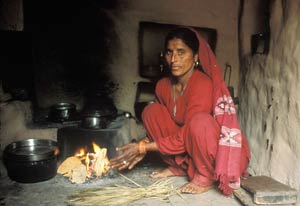NIH partners on clean cookstoves initiative
October 2010 | Volume 9, Issue 5

Photo by Curt Carnemark/World Bank
NIH has joined the Global Alliance for Clean Cookstoves
to address the significant health risks caused by poorly
ventilated indoor cooking fires, such as this one in India.
The NIH is participating in a new partnership to address indoor air pollution caused by cookstoves, one of the top five health risks in developing countries. The Global Alliance for Clean Cookstoves, led by the United Nations Foundation, is intended to create a thriving global market for clean and efficient household cooking solutions to save lives, empower women and combat climate change.
Toxic smoke from stoves and open fires used for cooking by over half the world’s population prematurely kills nearly 2 million people each year, according to the World Health Organization.
"Today we can finally envision a future in which open fires and dirty stoves are replaced by clean, efficient and affordable stoves and fuels all over the world -- stoves that still cost as little as $25,” said Secretary of State Hillary Rodham Clinton. “By upgrading these dirty stoves, millions of lives could be saved and improved. Clean stoves could be as transformative as bed nets or vaccines."
The Secretary announced the project at the Clinton Global Initiative meeting in New York. The initial U.S. financial commitment to the Alliance is $50.82 million over the next five years. NIH is contributing about $25 million to support related research and research training efforts.
“Indoor cookstoves are a serious health concern in developing countries. The toxic emissions from these cooking fires cause low birth weights, pneumonia in young children, and heart and lung problems in adults,” said NIH Director Dr. Francis S. Collins. “Our research efforts will focus on reducing the impact of these cookstoves while evaluating new, cleaner technologies to improve human health.”
More Information
To view Adobe PDF files,
download current, free accessible plug-ins from Adobe's website.
Related Global Health Research Topics